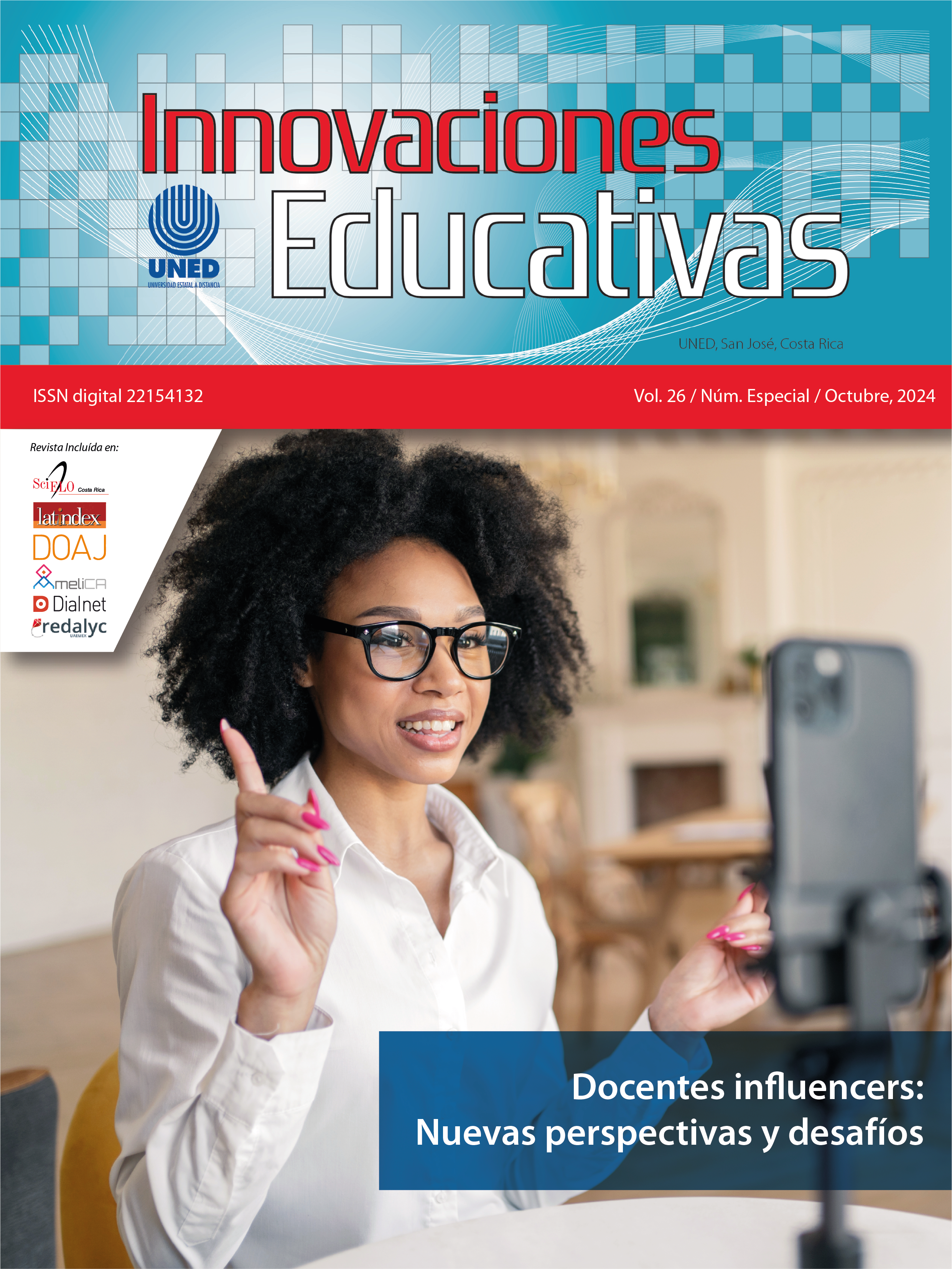Influencer teachers: Digital innovation and ethical challenges in the education of the future
DOI:
https://doi.org/10.22458/ie.v26iEspecial.5521Keywords:
teacher, social networks, community, digital platform, media educationAbstract
This text analyzes the phenomenon of teacher influencers, highlighting their definition, the challenges they face and the opportunities they offer both in education and in the media. Influencer teachers are professionals who, in addition to their work in the classroom, use digital platforms and social networks to share educational content, interact with their communities and generate impact beyond the traditional school environment.
Among the challenges they face are managing public exposure, reconciling their role as teachers
and content creators, and adapting to the demands of the digital age. However, this phenomenon also offers new perspectives to transform education, favoring pedagogical innovation and access to educational resources.
Through these platforms, they contribute to the democratization of knowledge and the strengthening of a more connected and collaborative educational community.
References
Bonilla-del-Río, M., Rojas-Estrada E. G. y Vizcaíno-Verdú, A. (2023). De la pizarra al trending topic: Docentes que conquistan redes sociales. En R. García-Ruiz (Ed.), La Alfabetización mediática y digital en el currículum: Propuestas didácticas transformadoras (pp. 46-60). Dykinson.
Carpenter, J. P., Shelton, C. C. y Schroeder, S. E. (2022). The education influencer: A new player in the educator professional landscape. Journal of Research on Technology in Education, 55(5), 749-764. https://doi.org/10.1080/15391523.2022.2030267
Carpenter, J. P., Shelton, C. C., Curcio, R. y Schroeder, S. (2021). The Education Influencer: New Possibilities and Challenges for Teachers in the Social Media World. En E. Langran y L. Archambault (Eds.), Proceedings of Society for Information Technology & Teacher Education International Conference (pp. 1712-1721). Association for the Advancement of Computing in Education (AACE). https://www.learntechlib.org/primary/p/219338/
Carpenter, J. P., Morrison, S. A., Craft, M. y Lee, M. (2020). How and why are educators using Instagram? Teaching and teacher education, 96, 103149. https://doi.org/10.1016/j.tate.2020.103149
Costa-Román, O., Forteza-Martínez, A., Rodríguez-Peral, E. M. y Alonso-López, N. (2022). Influencers educativos españoles en la red social instagram. En P. González-Aldea, E. Herrero-Curiel, J. Gil-Quintana y D. Recio-Moreno (Eds.). Alfabetización mediática y factor relacional (pp. 106-121). Fragua. https://acortar.link/GaNQP7
Davis, S. y Yi, J. (2022). Double tap, double trouble: Instagram, teachers, and profit. E-Learning and Digital Media, 19(3), 320-339. https://doi.org/10.1177/20427530211064706
Dousay, T. A., Graves Wolf, L., Santos Green, L. y Asino, T. (2018). Rise of the “Teacher Influencers”: Examining the benefits and conundrums. En E. Langran y J. Borup (Eds.), Proceedings of Society for Information Technology & Teacher Education International Conference (pp. 1031-1033). Association for the Advancement of Computing in Education (AACE). https://www.learntechlib.org/primary/p/182650/
García-Aretio, L. (2017). Educación a distancia y virtual: calidad, disrupción, aprendizajes adaptativo y móvil. RIED-Revista Iberoamericana de Educación a Distancia, 20(2), 9-25.
Gil-Fernández, R. y Calderón-Garrido, D. (2021). El uso de las redes sociales en educación: Una revisión sistemática de la literatura científica. Digital Education Review, 40, 82-109. https://bit.ly/3r7LtsG
Hartung, C., Ann Hendry, N., Albury, K., Johnston, S., y Welch, R. (2022). Teachers of TikTok: Glimpses and gestures in the performance of professional identity. Media International Australia, 186(1), 81-96. https://doi.org/10.1177/1329878x211068836
Hassoubah, L. N., Ryding, D., & Vignali, G. (2024). Revolutionizing edu-influencers as minorities nudging sustainable fashion consumption on instagram. En N. Chang Bi, y R. Zhang. Global perspectives on social media influencers and strategic business communication (pp. 181-214). IGI Global. https://doi.org/10.4018/979-8-3693-0912-4.ch010
Nicoll, S. (2022). Empowering pre-service teachers: Perhaps being an influencer is a good thing? En K. Heggart, y S. Kolber (Eds.), Empowering Teachers and Democratising Schooling (pp. 223-237). Springer. https://doi.org/10.1007/978-981-19-4464-2_15
Prensky, M. (2009). Homo sapiens digital: de los inmigrantes y nativos digitales a la sabiduría digital. En R. Aparici (Ed.), Conectados en el ciberespacio (pp. 93-106). Madrid: UNED.
Salazar-Vallejo, G. y Rivera-Rogel, D. (2024). Edutokers latinoamericanos: alcance e interacción 2.0. Anuario Electrónico de Estudios en Comunicación Social “Disertaciones”, 17(2). https://doi.org/10.12804/revistas.urosario.edu.co/disertaciones/a.13972
Sánchez-Rojo, A., Alonso-Sainz, T., y Martín-Lucas, J. (2024). La pedagogía ante el desafío digital: nuevas materialidades. Teoría De La Educación, 36(2), 25-42. https://doi.org/10.14201/teri.31752
Schroeder, S., Shelton, C., y Curcio, R. (2023). Crafting the consumer teacher: education influencers and the figured world of K-12 teaching. Learning, Media and Technology, 49(3), 442-455. https://doi.org/10.1080/17439884.2023.2207140
Downloads
Published
How to Cite
Issue
Section
License
Copyright (c) 2024 Innovaciones Educativas

This work is licensed under a Creative Commons Attribution-NonCommercial-NoDerivatives 4.0 International License.









